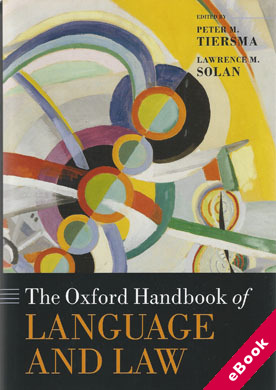We are now closed for the Christmas and New Year period, returning on Monday 5th January 2026. Orders placed during this time will be processed upon our return on 5th January.

The device(s) you use to access the eBook content must be authorized with an Adobe ID before you download the product otherwise it will fail to register correctly.
For further information see https://www.wildy.com/ebook-formats
Once the order is confirmed an automated e-mail will be sent to you to allow you to download the eBook.
All eBooks are supplied firm sale and cannot be returned. If you believe there is a fault with your eBook then contact us on ebooks@wildy.com and we will help in resolving the issue. This does not affect your statutory rights.
This book provides a state-of-the-art account of past and current research in the interface between linguistics and law. It outlines the range of legal areas in which linguistics plays an increasing role and describes the tools and approaches used by linguists and lawyers in this vibrant new field.
Through a combination of overview chapters, case studies, and theoretical descriptions, the volume addresses areas such as the history and structure of legal languages, its meaning and interpretation, multilingualism and language rights, courtroom discourse, forensic identification, intellectual property and linguistics, and legal translation and interpretation.
Encyclopedic in scope, the handbook includes chapters written by experts from every continent who are familiar with linguistic issues that arise in diverse legal systems, including both civil and common law jurisdictions, mixed systems like that of China, and the emerging law of the European Union.